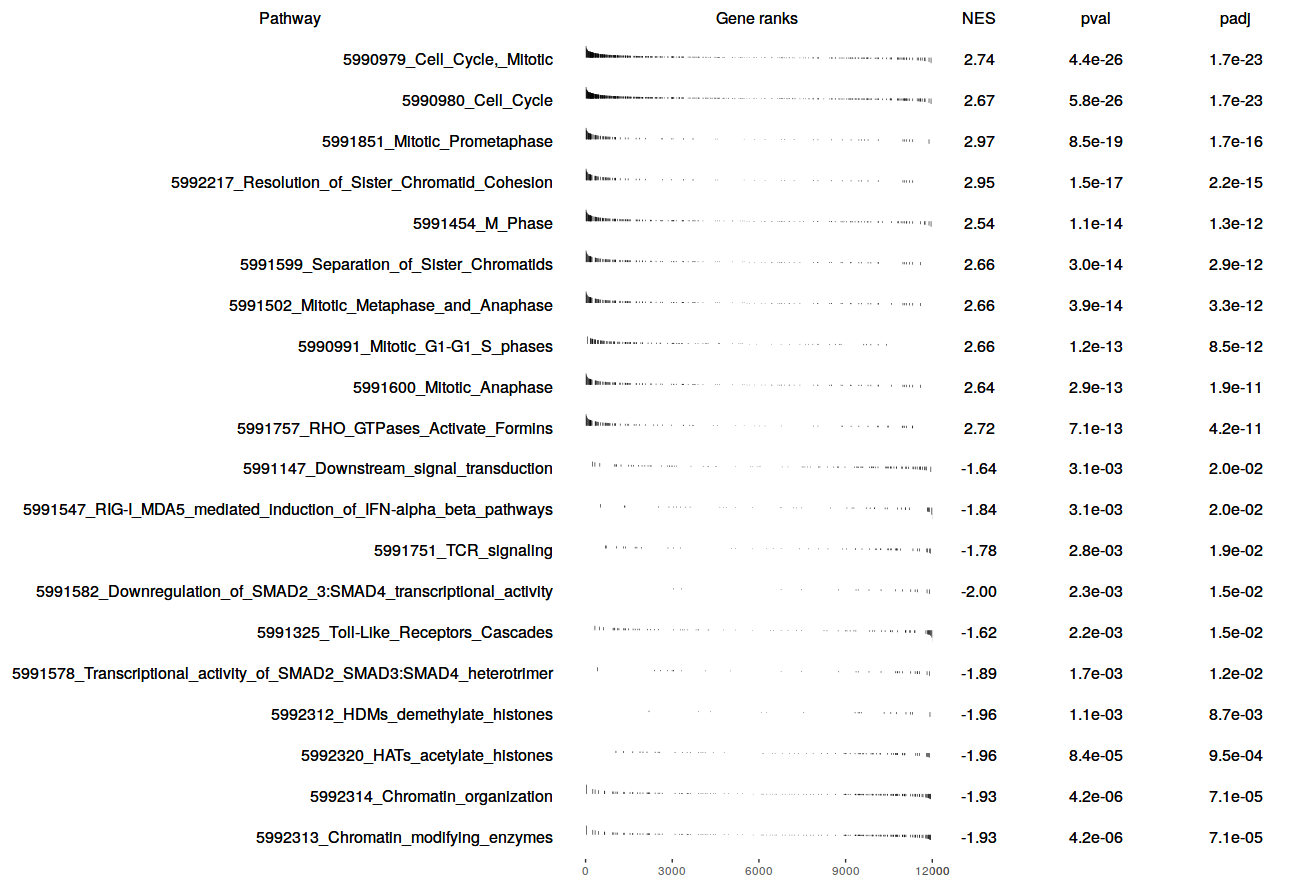fgsea is an R-package for fast preranked gene set enrichment analysis (GSEA). This package allows to quickly and accurately calculate arbitrarily low GSEA P-values for a collection of gene sets. P-value estimation is based on an adaptive multi-level split Monte-Carlo scheme.
See the preprint for algorithmic details.
Full vignette can be found here: http://bioconductor.org/packages/devel/bioc/vignettes/fgsea/inst/doc/fgsea-tutorial.html
fgsea is a part of R/Bioconductor and is availble on Linux, macOS and Windows platforms. For the installation instructions and more details please refer to https://bioconductor.org/packages/release/bioc/html/fgsea.html
The latest version of fgsea can be installed from GitHub using devtools package, which can take up to a few minutes to install all the dependencies:
library(devtools)
install_github("ctlab/fgsea")
Loading libraries
library(data.table)
library(fgsea)
library(ggplot2)
Loading example pathways and gene-level statistics:
data(examplePathways)
data(exampleRanks)
Running fgsea (should take about 10 seconds):
fgseaRes <- fgsea(pathways = examplePathways,
stats = exampleRanks,
minSize = 15,
maxSize = 500)
The head of resulting table sorted by p-value:
pathway pval padj log2err ES NES size
5990979_Cell_Cycle,_Mitotic 1e-10 4e-09 NA 0.5595 2.7437 317
5990980_Cell_Cycle 1e-10 4e-09 NA 0.5388 2.6876 369
5990981_DNA_Replication 1e-10 4e-09 NA 0.6440 2.6390 82
5990987_Synthesis_of_DNA 1e-10 4e-09 NA 0.6479 2.6290 78
5990988_S_Phase 1e-10 4e-09 NA 0.6013 2.5069 98
5990990_G1_S_Transition 1e-10 4e-09 NA 0.6233 2.5625 84
5990991_Mitotic_G1-G1_S_phases 1e-10 4e-09 NA 0.6285 2.6256 101
5991209_RHO_GTPase_Effectors 1e-10 4e-09 NA 0.5249 2.3712 157
5991454_M_Phase 1e-10 4e-09 NA 0.5576 2.5491 173
5991502_Mitotic_Metaphase_and_Anaphase 1e-10 4e-09 NA 0.6053 2.6331 123
As you can see fgsea has a default lower bound eps=1e-10 for estimating P-values. If you need to estimate P-value more accurately, you can set the eps argument to zero in the fgsea function.
fgseaRes <- fgsea(pathways = examplePathways,
stats = exampleRanks,
eps = 0.0,
minSize = 15,
maxSize = 500)
head(fgseaRes[order(pval), ])
pathway pval padj log2err ES NES size
5990979_Cell_Cycle,_Mitotic 4.44e-26 1.70e-23 1.3267 0.5595 2.7414 317
5990980_Cell_Cycle 5.80e-26 1.70e-23 1.3189 0.5388 2.6747 369
5991851_Mitotic_Prometaphase 8.50e-19 1.66e-16 1.1239 0.7253 2.9674 82
5992217_Resolution_of_Sister_Chromatid_Cohesion 1.50e-17 2.19e-15 1.0769 0.7348 2.9482 74
5991454_M_Phase 1.10e-14 1.29e-12 0.9865 0.5576 2.5436 173
5991599_Separation_of_Sister_Chromatids 3.01e-14 2.94e-12 0.9653 0.6165 2.6630 116
One can make an enrichment plot for a pathway:
plotEnrichment(examplePathways[["5991130_Programmed_Cell_Death"]],
exampleRanks) + labs(title="Programmed Cell Death")
Or make a table plot for a bunch of selected pathways:
topPathwaysUp <- fgseaRes[ES > 0][head(order(pval), n=10), pathway]
topPathwaysDown <- fgseaRes[ES < 0][head(order(pval), n=10), pathway]
topPathways <- c(topPathwaysUp, rev(topPathwaysDown))
plotGseaTable(examplePathways[topPathways], exampleRanks, fgseaRes,
gseaParam=0.5)

